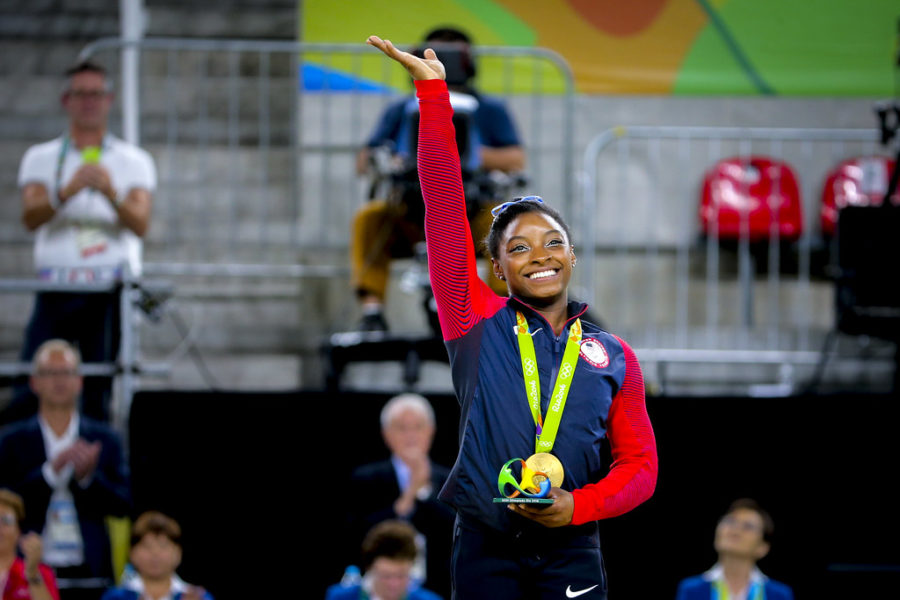A brave withdrawal
Athletes suffer from a stigma around mental health; Simone Biles works to fix it
Simone Biles entered the Tokyo Olympics as far more than a gymnastics prodigy. She was the inspiration for young Black athletes nationwide. She was the face for the Summer Games for NBC. She was the leading voice against sexual abuse after she spoke up against the crimes of Lawrence G. Nassar, the doctor for the United States women’s gymnastics team. She was an idol for young women everywhere.
So when Biles withdrew from the Olympic gymnastics team all-around on Jul. 27, fans acted as if she threw the world on its axis. She had to assure reporters that her condition wasn’t physical, which led to further confusion. Why else would she quit and leave her team hanging? Why would she let the nation down?
Her reasons can be filtered down to one main cause: stress. Only a couple years ago, an athlete of Bile’s status may have been reluctant to admit they struggled with pressure, much less to have withdrawn in the middle of the Olympics. But Bile’s situation made her a danger to herself as she developed a condition only familiar to fellow gymnasts: the “twisties,” a condition that causes gymnasts to lose control of their bodies while spinning through the air. Recognizing that she would only be endangering herself if she continued, Biles had the courage to acknowledge her vulnerability publicly.
Biles isn’t actually the only athlete to cite mental health issues in recent years. Tennis star Naomi Osaka withdrew from this year’s French Open rather than shoulder what she thought to be invasive questions from the media. Michael Phelps also started discussing his struggle with depression and suicidal thoughts before the 2016 Olympics in Rio. Research cited by the Athletes For Hope foundation found that up to 35% of elite athletes suffer from mental health conditions which may manifest as anxiety, depression, eating disorders, overtraining, self-medication and suicide. That’s millions of athletes; so why have only a few spoken up?
The answer lies in the culture and environmental factors that surround athletics, especially at the professional level. Athletes of any sex, gender identity and sexual orientation suffer from stigma surrounding mental illness, in part related to the the toxic masculinity surrounding athletics that makes athletes feel they need to appear resilient, for if they don’t they would be risking their playing time, starting roles or endorsements/sponsors. Not to mention the extreme internal perfectionism that only worsens overly critical self-evaluations, and therefore makes professional athletes stay clear of visible vulnerability.
Mental illnesses in athletes also stem from factors other than doing well athletically. In the Clinical Journal of Sports Medicine, an essay on psychological factors in athletes states that 32% of male and 15% of female athletes recall sexuality-related bullying when engaged in school athletics. Hazing and bullying are both common but dangerous practices in athletic culture. 60% to 95% of college athletes who were the victim of hazing stated that they would not report their incident, some of the reasons being allegiance to fellow teammates, fear of retribution, uncertainty in authority, normalization of hazing behavior, and victim-blaming, with the perception that participants choose to be involved with hazing activities. Beyond the team, fans also choose to harass players, a recent form being when three Black soccer players on the English team faced racial abuse after their defeat to Italy this past year.
One of the most vulnerable periods for an athlete is the period of “imminent achievement,” where athletes are in their developmental phase before reaching elite-level status. There is often a heightened level of stress and dependence on coaches and training staff, which in turn leaves the athlete more vulnerable to predation. The pre-athlete is more likely to tolerate inappropriate behavior rather than compromise their future careers. Lawrence G. Nassar, the prior team doctor for the United States women’s national gymnastics team, sexually assaulted at least 265 young women under the guise of medical treatment before he was convicted.
The list goes on for factors that can easily induce mental illnesses in athletes, including injuries, abuse from coaches and more. Being an athlete myself, I only know the experience of high school volleyball, being white and heterosexual in a privileged neighborhood. The excessive pressure that professional athletes have to face, especially being a person of color, of a sexual minority and on the world stage, is something that some of us can only imagine. It’s thanks to people like Simone Biles, Naomi Osaka and Michael Phelps that the stories of mental illness in athletics are told, and we must help the conversation continue for the sakes of athletes worldwide, from small stages to the Olympics.

Hi! I'm a book, dog, and boba lover, and I don't really know what I'm doing, but who does?



